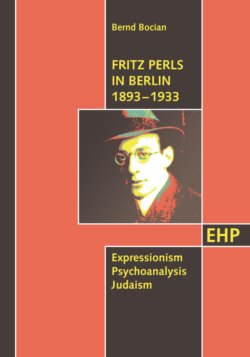Читать книгу Fritz Perls in Berlin 1893 - 1933 - Bernd Bocian - Страница 13
На сайте Литреса книга снята с продажи.
2. The Jewish Context and the Educational Ideal of Classical Humanism
ОглавлениеAn obscure lower middle class Jewish boy. (F. Perls 1977, 1)
Roses are reddish, violets are blueish.
If it wasn’t for Christmas,
we’d all be Jewish. (F. Perls in Kogan 1976)
In the question of whether Perls was a Jew, I follow the argumentation of Leon Botstein. Viewing a person as a Jew and labeling him one, even though he himself did not fundamentally feel like a Jew or define himself as such, is to apply an »extremely racist definition« (Botstein 1991, 15). Botstein argues:
The only legitimate reason for using the maximal definition – which is to say, everyone who had one or two generations of Jewish forebears was a Jew – lies in the fact that it constitutes an objective historical reality which was created through widespread anti-Semitism beginning at the end of the 18th century. Assimilation notwithstanding, the majority of people, either in the German-speaking countries or in Russian and Polish circles, never let it slip their mind if someone had Jewish ancestry. (ibid., 17)
On the first page of his autobiographical outline, Fritz Perls calls himself a »lower middle class Jewish boy« (Perls 1977, 1), and the collection of memories published by Gaines contains reports that even in his final years he continued to come out with Yiddish sayings and rabbi stories (see Gaines 1979, 338 f.). His grandparents were religious, as was his mother and possibly also his oldest sister, Elisabeth, who worked as a secretary for the Jewish community in Berlin. His father appears to have been an emancipated and enlightened assimilated Jew whose sole orientation was the abstract religious humanism of the Free Mason movement. As a boy, Fritz Perls learned Hebrew in preparation for his Bar Mitzvah, a ceremony through which he came of age in a religious sense at thirteen. The preparatory instruction at the synagogue was »impersonal« (Perls 1977, 249) and the ceremonies in the synagogue remained »strange and peculiar« to him (ibid.). Yet by being bar mitzvahed, Perls received more instruction in the Jewish religion than Sigmund Freud, for example, (see Gay 1988, 131) although like the latter he remained an »unbelieving Jew« (Freud in Gay ibid., 133).
Since the Jewish context5 of Perls’s life has not received close attention until now, I would like to begin this monograph by providing basic information on the situation of Jews in the German Empire up until the time that Perls was born.
